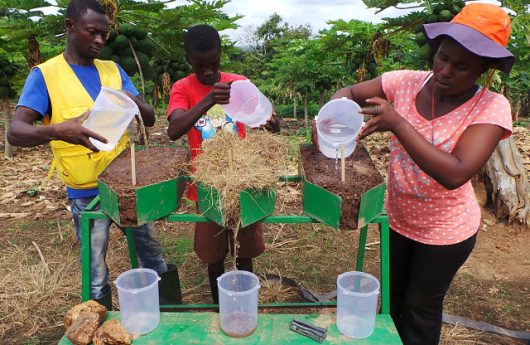Sustainable Agriculture in Ghana Alleviates Poverty

Ghana is a small country located in West Africa along the Guinea Bay. The country is rich in natural resources, especially oil and gold, but nearly 45 percent of the country’s population is employed in the agricultural sector and agriculture makes up 18 percent of Ghana’s gross domestic product (GDP).
Coca, rice, cassava, peanuts, and bananas are some of the top agricultural products grown in Ghana. Coca is one of the country’s popular exports, alongside oil, gold and timber. Despite being resource-rich, Ghana’s economy has been contracting. Its current growth is around negative 6 percent. Countries and organizations around the world, alongside Ghana’s government and people, have recognized this problem and are currently promoting sustainable agriculture in Ghana so that they can carve a brighter future for this recovering African nation.
Feed the Future Program
The United States Agency for International Development (USAID) has chosen Ghana, specifically Northern Ghana, as one of its focus nations for its Feed the Future Program. USAID reports that the majority of farmers in this part of the country own small farms that are often less than five acres. Much of this land is covered in pour soil. Due to climate change and the inherent climate of the region, rain is unpredictable.
These challenges mean that malnutrition is high amongst the population. USAID’s Feed the Future Program aims to increase the productivity of these farms that mainly produce corn, rice and soybeans and promote sustainable agriculture in Ghana. Since 2012, Feed the Future has helped supply 156 thousand producers with better farming equipment and educate them on sustainable farming techniques. These techniques have led to the alleviation of some of the malnutrition and poverty issues. They also earned the farmers a total of $40 million and $16 million in private investment.
Governments Role in Sustainable Agriculture in Ghana
This private investment is important to the government’s idea for the future of sustainable agriculture in Ghana. The Ghanaian Times reports that the government of Ghana recognizes the United Nation’s latest report about the future of food security. The government wants to do its part on the world stage and at home by promoting sustainable agriculture in Ghana.
Ghana’s Shared Growth and Development Agenda mention a few ways in which the country plans to do this. The government works with organizations such as the USAID and many programs based in Africa, such as the Comprehensive Africa Agriculture Development Program. Sustainable agriculture in Ghana is seen as a way to strengthen food security, alleviate poverty in the country and promote private sector growth.
Trax Ghana
Trax Ghana is a small nongovernmental organization that promotes sustainable agriculture in Ghana for all of the reasons mentioned above. Like the USAID Feed the Future Program, Trax Ghana operates mainly in Northern Ghana. It promotes the nitty-gritty of sustainable agriculture. It teaches farmers about the importance of soil management and how to construct proper animal pens. The organization also promote gender equality, teach business skills and farming skills to both women and men for over 25 years, since the organization was founded.
Attacking the issue of poverty from multiple fronts and with multiple allies, the future of sustainable agriculture in Ghana looks bright. Ghana’s government is in collaboration with USAID to set up the Ghana Comprehensive Agriculture Project to increase private sector investment into the agriculture sector. It will take time and there will probably be some setbacks, but with so many people dedicated the practicing and promoting the practice of sustainable agriculture, the country has a good chance of succeeding.
– Nicholas DeMarco
Photo: Flickr
